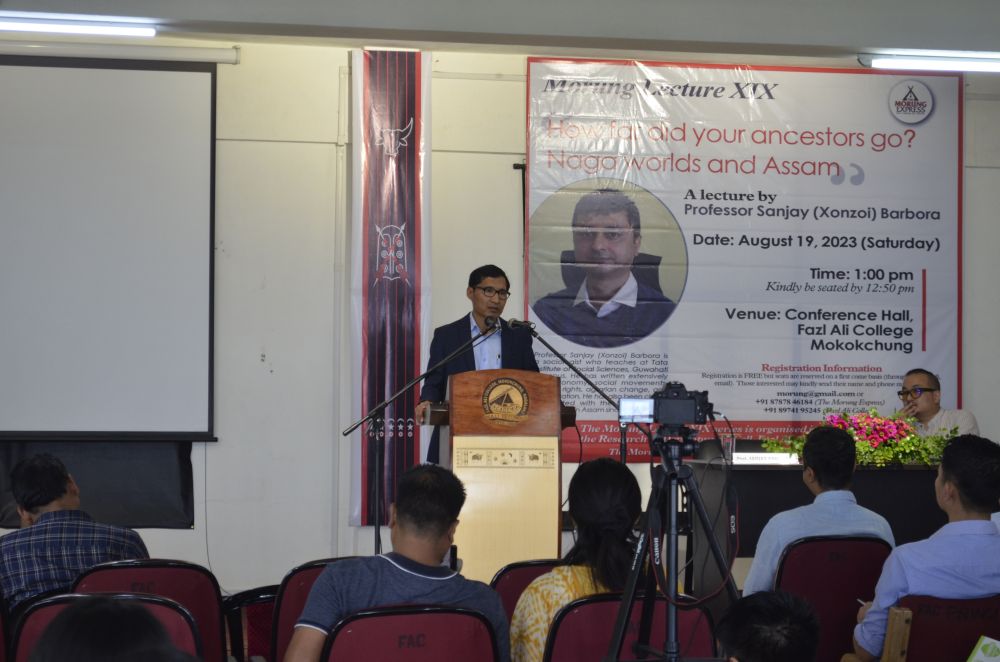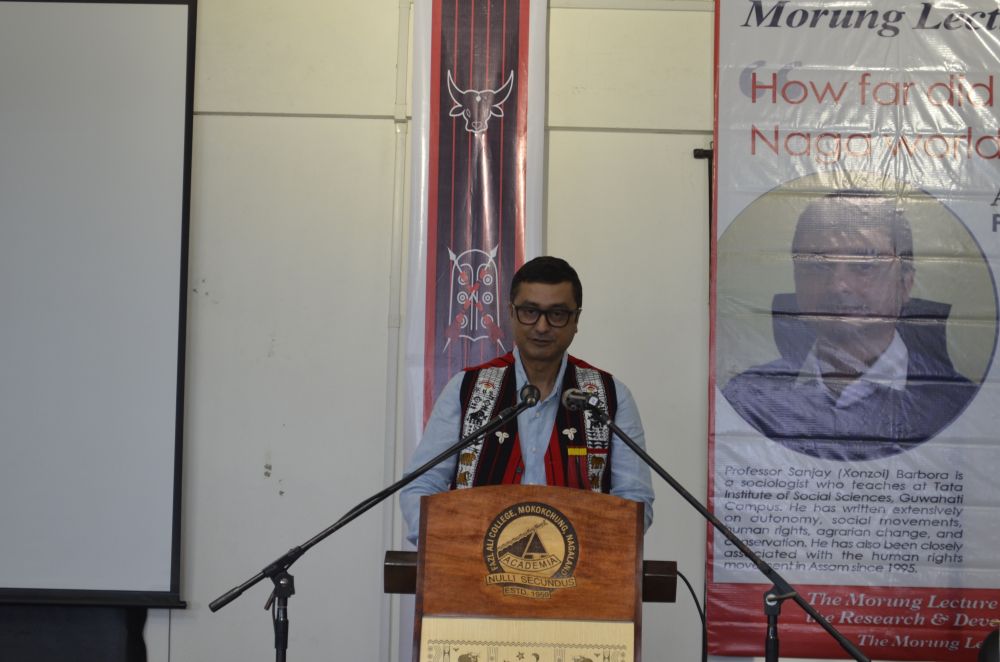A participant poses a query to Professor Sanjay (Xonzoi) Barbora during the Morung Lecture XIX jointly organised by the Fazl Ali College Mokokchung and The Morung Express at the college on August 19. (Morung Photo)
The Morung Lecture XIX dwells on ways to resolve Assam-Naga border issues
Morung Express News
Mokokchung | August 20
The discourse among the audience and Professor Sanjay (Xonzoi) Barbora during the Morung Lecture XIX revolved around border conflicts plaguing communities, particularly between the two neighbouring states of Assam and Nagaland and the need for practical solutions.
The necessity of listening to the voices of the people, re-integrating the traditional ways of resolving land conflicts, the genuine involvement of state machineries on communal issues and the need to know and rekindle the depth of solidarity and affection that the indigenous people of the North-East share/d, and the willingness to go back to know how our ancestors fostered close relationships, were some measures highlighted as a way of solving the problem during the interaction.
FAC Principal Dr I Wati Imchen delivers the welcome address during the Morung Lecture XIX jointly organised by the Fazl Ali College Mokokchung and The Morung Express at the college on August 19. (Morung Photo)
During the discourse, the Additional Deputy Commissioner Mokokchung, Chumlamo Humtsoe touched on the border issue between Assam and Nagaland, which he maintained is commonplace to hear and talk about among the public in Mokokchung.
While a verdict is being awaited at the Supreme Court, he reasoned that it will not be in favour of both the parties involved and would require alternative solutions. While both the parties have oral histories, they lack documentary evidences of the lands in conflict, he noted.
Barbora held that it was difficult for the court to understand local complexities, especially given its numerous responsibilities.
Narrating a study done by Tezpur University on border conflicts in Arunachal and Assam, he stated that the solution has to be both places, where legally the elected leaders have to find a way in dealing with the complex issues.
“We need to recognise that there is another level that one needs to listen to, which is the level of the people, for whom word of mouth, assurances and memories are actually of equal importance than what the Supreme Court says,” the sociologist stressed.
Professor Sanjay (Xonzoi) Barbora, delivering the Morung Lecture XIX on, "How Far Did Your Ancestors Go? Naga Worlds And Assam," jointly organised by Fazl Ali College, Mokokchung and The Morung Express at the college on August 19. (Morung Photo)
Queried on whether the involvement of state machineries on any issue (and not necessarily border conflicts) between two communities become more complicated, he opined that a lot depends on the disposition of the bureaucrats who are temporarily responsible for certain actions of the state.
He believed that the state has potential to actually address some of these pressing issues, “and they cannot ignore it.”
However, the professor also noted that a lot depends on the people who are given the responsibility on whether they have the right training, the ability and the humility to listen to the voices of the people. If they cannot do any of these things, then the conflicts will only be amplified.
FAC Principal Dr I Wati Imchen also shared stories of his forbears’ journey to Assam where they were welcomed wholeheartedly by the people.
The cordial relationship that the Ahoms and the Nagas shared has now suddenly become stale, he noted, wondering whether it was the gap of the good rapports that were getting wider or some external agencies were trying to create disunity amongst the people.
“Is there a possibility of renewing the good relationship and the love that existed many years back?” he asked.
Meanwhile, Barbora held that it depends on how far is the present generation willing to go to re-establish what the ancestors had built over the years.
The problem, he elaborated, lies on how fast we have picked up on what the Britishers said on the exchange of goodwill between the Ahoms and the Nagas in the border villages in the past.
“And the Britishers said that the Nagas came to raid, and generations after generations of Assamese scholars have reproduced this lie.”
This is where we need to have a new imagination, and also to embrace the things of the past where we can go back and have a conversation again, without the mediation of a colonising power, he added.
In doing so, the conversation would look “very different” and one would realise that the exchange of goodwill back then was not “blackmail,” but was “tribute,” the professor maintained, adding: “And for reasons best known to our ancestors, that tribute was maintained until the British came and even after the British left.”
It still maintained, however, it has become almost secretive in the family, which should not be, he regretted.
Barbora also posed whether the present generation can recover the misconceptions of our past and can reconstruct the history of the Northeast, and not the history that the colonial Britishers had constructed.
Under the topic, "How Far Did Your Ancestors Go? Naga Worlds and Assam," the Morung Lecture XIX, was jointly organised by the Fazl Ali College (FAC) and The Morung Express on August 19.







